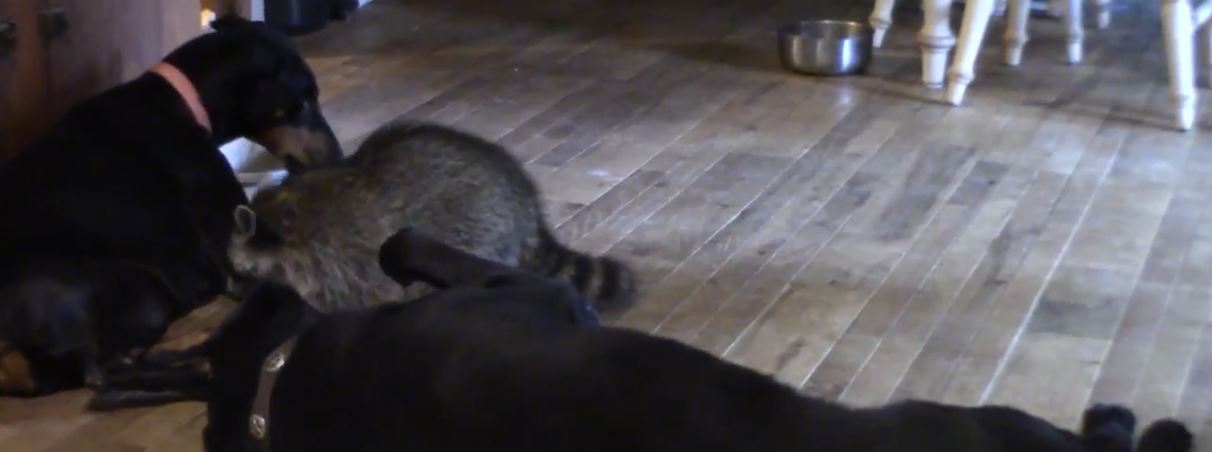Can Wild Animals Harm Your Pets?

Whether you have the occasional animal visitor to your yard or like to go on walks through the woods with your dog, it is common to wonder whether wild animals can harm your pets. The short answer is that yes, because these animals are wild in nature, they react based on instinct and this can lead to hunting your pet in the case of larger wild animals or simply fighting to defend themselves in the case of smaller ones. While it is true that wildlife can hurt your furry friend in some ways, simple prevention and knowledge may be all you need to keep your pet safe, whether he is a dog, cat, or some other animal.
Spreading Disease
One of the most common ways in which wild animals will harm your pets is not intentional on their part; it is by spreading disease. Many people are concerned about their pooch contracting rabies from a wild animal and this is a risk despite the number of wildlife with rabies being lower than most people think. Simply keeping your pets up to date on their rabies vaccine can prevent this issue, but there are also other illnesses that wildlife can spread to pets. These include distemper, panleukopenia, and leptospirosis.
In addition to disease, it is also possible for wild animals to unknowingly give your pet parasites. These can include internal organisms such as roundworms as well as exterior ones such as fleas and ticks.
Injuries Through Fighting
When most people think about their pets being hurt by wild animals, they picture them fighting with each other and this is a very real possibility. In the case of smaller animals, such as rodents, squirrels, and birds, it is possible that your dog or cat will see the animal and immediately have their instincts kick in, encouraging them to hunt. When this happens, the animal will either run away or try to defend itself; during the defense, your furry friend may become injured.
In the case of larger wild animals, such as coyotes or bears, your pet may be seen as prey. When this happens, the animal will try to hunt your dog or cat, and if they are smaller than the animal hunting them, they have a high risk of being injured or killed. It is also possible that a wild animal of any size or species will become territorial when it sees your pet and become defensive or aggressive.
Indirect Harm
In addition to direct injuries from fighting or transmitting diseases via contact, wildlife may also indirectly harm your pet. The most common instance of this would be when your cat or dog is chasing a wild animal that it views as prey. During the chase, animals have been known to focus solely on their prey, ignoring surroundings. This greatly increases your animal's risk of running into oncoming traffic, getting hit by a car, or becoming injured in some other way due to distraction.
Preventing Interactions
Since wild animals do indeed pose a risk to your furry family member, you will want to take steps to prevent any pet-wildlife interactions. The most effective way to do this is to always keep an eye on your pet when they are not at home. If you have a cat, make it an indoor cat; they tend to live significantly longer than outdoor or indoor/outdoor cats due to the lower risk of disease and predators. You could also create a caged in outside play area for your cat if you would like.
Similarly, dog owners should never give their pooches the opportunity to roam free without supervision. Always keep your dog on a leash when walking through forests or other areas with a great deal of wildlife. If you let your dog outside alone, make sure he is in a fenced-in area and always keep him nearby while on walks, preferably on a leash unless you can trust him not to chase a stray bird or squirrel.
Keeping Wild Animals Away
To further minimize the risk to your pet, work to keep wild animals off of your property. The best way to do this is to remove their potential food and shelter. Trim back overgrown trees and shrubs and organize wood piles where animals may live. When leaves, nuts, or berries fall from your trees, clean them up right away and always keep your garbage cans firmly closed to prevent a potential food source. Also be sure to always feed your pets inside so their food won't attract wildlife.
Stay Up To Date With Vet Visits
It isn't possible to watch your pet all day every day, which leaves the possibility, however slim, of danger from a wild animal. As such, you want to make sure that you keep up with your regular vet visits. Make sure that your pet has all of his shots and vaccines, including that for rabies and check him regularly for fleas and ticks, especially after any trip outside. Those simple precautions will minimize any harm that wild animals can do to your pets.
Read the Pest Wildlife Home Page page for helpful information and to learn more about Can Wild Animals Harm Your Pets?

